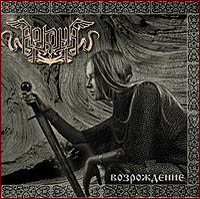ARKONA (ru) - Vozrozhdeniye (2008)

Label : Vic Records / La Baleine
Sortie du Scud : 2008
Pays : Russie
Genre : Russian Pagan Metal
Type : Album (Réédition - 20 avril 2004)
Playtime : 12 Titres - 58 Mins
Masha Scream est un personnage atypique. Cette guerrière aux longs cheveux incarne à elle seule le Pagan Metal version russe. Et ARKONA est son étendard. Rien de tel que de se replonger dans Vozrozhdeniye, le premier opus d’ARKONA, pour prendre conscience que l’Europe de l’Est rend aussi hommage à son folklore à grands coups de guitares acérées et peaux martyrisées. Vozrozhdeniye, sorti à l’époque (en Avril 2004) sur le label Sound Age Production, fait aujourd’hui l’objet d’une réédition par Vic Records, au même titre que les albums suivants, Lepta et Vo Slavu Velikim.
Vous l’aurez compris, Masha et ses comparses d’ARKONA, fiers de leurs racines et peu enclins à se soumettre au langage anglophone, chantent intégralement en Russe. Et même si Vozrozhdeniye ne représente en rien l’opus parfait, il possède ce charme authentique, cette aura indissociable qui l’élèvent au rang d’album culte. Bourré de défauts, mais absolument culte.
Des défauts, parce que « Chernye Vorony » et sa horde de brutes avinées qui beuglent et éructent dans la langue de Staline, ça fait peur … ça repousse, même … Comme ce « Maslenista », beaucoup trop festif pour être pris au sérieux. En fait, le gros point noir sur ce premier méfait est clairement identifié et se nomme « clavier ». Manque de moyen ? Manque de maîtrise ? On sent que Masha aurait voulu caser de la flûte ou des cordes sur sa musique, et que cela s’est révélé impossible. Certains morceaux y perdent carrément leur crédibilité, à l’image de « K Domu Svaroga ». Et sur « Zalozhniy », avec ce synthé bondissant sur fond de Speed Metal tout droit sorti d’un mauvais RHAPSODY, où une voix typiquement Black vient sauver tout ça de la catastrophe …
On se fait la même réflexion sur « Solntsevorot », sauf que la voix de Masha, adoptant des lignes vocales très traditionnelles et entraînantes, finit par rendre le titre agréable, voire convaincant. Et voilà, ARKONA, c’est ça. Car après avoir parlé du « pire », il faut reconnaître que le combo russe a mis au monde quelques chefs d’œuvre mémorables. Quand les rythmiques décalées sont menées tambour battant (« Po Zverinym Tropam »). Et quand les orchestrations se font plus menaçantes, tout en ambiance, on touche le sublime … comme ce « Zov Predkov », et la longue incantation de Masha qui annonce une accélération furibonde à la EMPEROR. Quand une guitare presque mélancolique suit ce clavier magnifique, sur le ralenti « Rus », on croirait déceler un paysage presque gothique peint sur le front russe. Ecoutez cette voix Black et ces guitares qui tourbillonnent sur « Brate Slavyane » et laissez-vous hypnotiser …
Il y a enfin ce titre éponyme et « Kolyada », deux pièces épiques oscillant entre Metal extrême et folklore omniprésent, faisant la part belle à des six-cordes presque dansantes mais jamais ridicules. Masha s’en donne à cœur joie et chante avec conviction, on croit par instants percevoir la flamme qui brûle en elle. Une guerrière immortelle, qui croit profondément en ce qu’elle fait, dit et joue.
Vous cherchiez l’emblème du Metal russe ? Ne cherchez plus …
Tracklisting (russe traditionnel / russe phonétique) :
1 – Коляда / Kolyada
2 – Масленица / Maslenitsa
3 – К дому Сварога / K Domu Svaroga
4 – Возрождение / Vozrozhdeniye
5 – Черные вороны / Chernye Vorony
6 – Русь / Rus
7 – Брате славяне / Brate Slavyane
8 – Солнцеворот / Solntsevorot
9 – Под мечами... / Pod Mechami
10 – По звериным тропам... / Po Zverinym Tropam
11 – Заложный / Zalozhniy
12 – Зов предков / Zov Predkov
Ajouté : Samedi 04 Avril 2009
Chroniqueur : NicoTheSpur
Score :    
Lien en relation: Arkona Website
Hits: 17507
|














